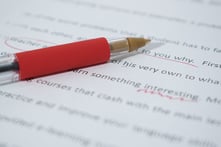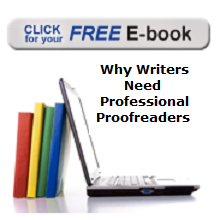 Professional proofreaders work hard to carefully examine every detail in your written work. They scan it multiple times to fix typos, grammar errors and spelling mistakes, and to ensure that it’s consistent in style and voice. But sometimes, especially if you have someone editing your writing, you may think that it’s okay to skip hiring a proofreader and save the time and money. If more than one set of eyes has scanned your work, then it should be good to go, right? Well … not exactly. Editors are certainly valuable and can fix and point out certain errors in your writing, but they aren’t trained to do the same things that proofreaders do. (Read Editor or Proofreader: Who Does What? to learn more about that.)
Professional proofreaders work hard to carefully examine every detail in your written work. They scan it multiple times to fix typos, grammar errors and spelling mistakes, and to ensure that it’s consistent in style and voice. But sometimes, especially if you have someone editing your writing, you may think that it’s okay to skip hiring a proofreader and save the time and money. If more than one set of eyes has scanned your work, then it should be good to go, right? Well … not exactly. Editors are certainly valuable and can fix and point out certain errors in your writing, but they aren’t trained to do the same things that proofreaders do. (Read Editor or Proofreader: Who Does What? to learn more about that.)
Before becoming convinced that you can forgo hiring a proofreader for your writing, you should consider what you’re writing first and whether it requires the attention and care that a proofreader will assign to it.
Listed below are six types of writing you should always want a proofreader to review.
1. Published Articles
While it’s common for print magazines and publications to have proofreaders on staff, a lot of online publications don’t. This is a very short-sighted mistake, because it’s so easy to publish a proofing mistake online. And one could argue that an online proofing error could have more consequences associated with it too, since it can spread like wildfire.
Online, everything can be shared with the entire world in a matter of seconds with just one click of the mouse. Too often, online organizations and publications with mass audiences take this fact for granted. They don’t always proof content before posting and sharing, especially content that is attributed to another writer or content that is timely, such as “breaking news.” They’ll likely have an editor look it over, but not a proofreader. So, if you’re publishing an article on your website or blog or if you’re submitting an article to an online publication, you’ll want to make sure you have a proofreader look at it first.
2. Website Content
Your website is where people go to learn more about what you and your organization do, as well as to interact with your brand. The accuracy of the copy on your organization’s website can make or break its reputation. People will be less willing to contact you or buy from you if your website is riddled with proofing mistakes, especially if the proofing mistakes are part of product or service descriptions. They won’t trust you with handling their money or information if they find a lot of errors on your website.
So, you’ll want to ensure everything on your website is free of grammar errors and typos. Every time you refresh your website content, you’ll want to hire a proofreader. And keep in mind these 4 Important Areas to Proofread on Your Website.
3. Research Papers
The entire accuracy and integrity of the research represented and discussed in a paper can hinge on whether it was proofread. And there is no point in reading research if it is faulty or compromised in the slightest. Even if you think you’re only writing something for one professor or a few colleagues to spur a small discussion, you don’t want to risk writing about valuable research with an error in your text. Think of it this way: one wrong letter could throw off a chemical formula, and one incorrectly placed punctuation mark could change the entire meaning of a legal claim.
Others may want to quote your research in the future too, even if it’s not published now. And some day you may end up publishing a research paper you didn’t originally intend on publishing when you wrote it. Or you may simply want to look back on some of your work to develop new ideas. Always hire a proofreader to review any research papers you write.
4. White Papers
White papers vary in depth by industry. Some white papers are more detailed and contain a lot more facts and figures than others. But every white paper should still be proofread, regardless of its industry or focus. The sole purpose of a white paper is to be authoritative, and to shed light on a topic so that others may understand it better, be better equipped to solve a problem within the topic, or make an important decision.
A white paper full of typos and inaccuracies will not engender trust. In fact, you will most likely forfeit your reputation inside your industry as a thought leader and expert if you share a white paper full of mistakes.
5. Important Communications and Emails
If you’re writing an important email to a group of executives or to a group of external stakeholders, you’ll want a proofreader to review it first. If you’re writing an email that holds important disclosures, legal concerns, policies, or similarly confidential and legally binding information, then you’ll want to ensure they don’t have errors in them.
6. Books
This is probably the only type of writing where all writers seem to make it a point to hire a proofreader. However, not all books are published in print. So, you’ll want to hire a proofreader to review e-books too. And this applies for anything that’s published in book form, whether it’s fiction, non-fiction, an anthology, etc. Don’t think that just because something is published online people will be more forgiving of proofing mistakes. They won’t be. In fact, they’re probably more likely to write a bad review for an e-book that has a lot of mistakes in it. And bad online reviews can tank book sales, whether it’s in print or downloaded on an e-reader.
Quick Tips for Knowing When You Need a Proofreader
If you’ve written a document of any type (especially types not listed above) and are unsure if you need to hire a proofreader to review it or not, here are some tips for knowing that you may need one.
- A lot of industry jargon is used throughout the text
- Multiple resources are used and or mentioned throughout the text
- When you’re not a self-proclaimed grammarian and realize you’re terrible at spelling and punctuation
- If you’re attempting to follow a new style guide you aren’t familiar with yet
- Whenever you’re required to follow a company style guide or in-house style guide
- You intend to publish what you’ve written either online or in print
Not everything you write may have to be proofread. Not all social media posts, emails, and text messages need to be reviewed with a fine-tooth comb, for instance. But everything you write that’s important and has the potential to influence your reputation or professional standing should certainly be proofread. At the end of the day, use your best discretion. But whenever you’re in doubt, it’s probably best to just go ahead and hire a proofreader. No one will ever fault you for wanting to make sure your writing is the best that it can possibly be, but they will fault you for egregious writing errors.




